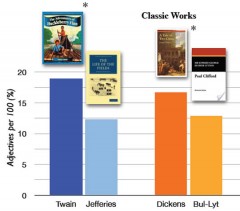Adjectives Drive Book Sales
 Want to make your next book a best-seller? Use more adjectives. It seems to work for authors ranging from Mark Twain to Malcolm Gladwell. Data from a Purdue University study shows that use of descriptive adjectives correlates with higher book sales:
Want to make your next book a best-seller? Use more adjectives. It seems to work for authors ranging from Mark Twain to Malcolm Gladwell. Data from a Purdue University study shows that use of descriptive adjectives correlates with higher book sales:
Can sensory-based description make books more accessible, memorable, and, ultimately, more successful? As a ?rst step at testing this hypothesis, we analyzed classic and current bestsellers for adjective use. Results indicated that popular writers use substantially more adjectives than peers who have written similar, though less successful, stories. [Emphasis added – from A Ridiculously Unbelievably Preposterous Conclusion: Use of Adjectives in Best-Selling Books]
The Purdue researchers contrasted the use in adjectives by successful and less successful authors, both in classics and modern books. For the classics, they counted the adjectives in the first hundred words of forty different novels by Mark Twain, Charles Dickens, Richard Jefferies, and Edward Bulwer-Lytton. These authors were contemporaries, but the first two sold far more books.
The approach with the modern writers was a bit different – they compared a sample of random pages from both non-fiction and fiction books by contemporary authors.
In each case, the better-selling authors used more adjectives. The contemporary difference was smaller, but still significant.
Why Adjectives Work
 The authors of the study believe that adjectives that are sensory in nature are more impactful and memorable.
The authors of the study believe that adjectives that are sensory in nature are more impactful and memorable.
Of course, even if you buy their sampling technique, what makes books sell better doesn’t automatically translate into more persuasive ad copy or sales letters. Still, there’s evidence that adjectives boost restaurant sales when used on menus, and that sensory adjectives light up our brains even when used metaphorically.
The consistent factor in all of this is that adjectives can’t be bland filler – they should be vivid, sensory and specific. They should engage our imagination.
One last picky point – wouldn’t the study’s title, A Ridiculously Unbelievably Preposterous Conclusion: Use of Adjectives in Best-Selling Books, have been more compelling if the first part was reworded to turn the adverbs into adjectives (A Ridiculous, Unbelievable, Preposterous Conclusion…)?
